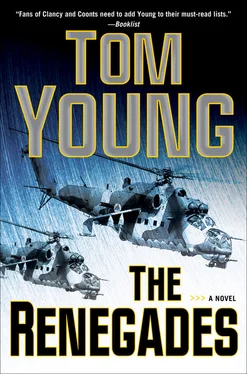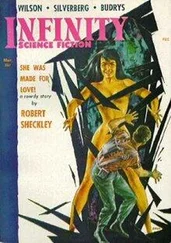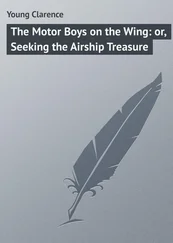“How long ago did those vehicles show up?” Gold asked.
“Ten minutes,” the intel officer said.
“Did they take anything out of the trucks?” Parson asked.
“Not that I’ve seen.”
Gold pulled up a metal folding chair, sat near the screen, crossed her legs. She took a pad from her cargo pocket, scribbled some notes, and put her pen behind her ear. Now Sophia looks more like herself, Parson thought.
He knew the trucks alone weren’t reason enough to lob a bunker buster onto those coordinates. It took more than a hunch to turn a point of interest into a target. The officers who made those decisions would need to see weapons, hear radio traffic about enemy operations, or gather some other information to make sure whoever was there needed killing.
But maybe this vindicated Gold’s wild-goose chase. At the very least, CENTCOM would probably put up another Predator. Or maybe they’d launch one of those Rivet Joint birds to listen in on any communications coming from that barren spot in the mountains. With just a bit more intelligence, somebody somewhere could push a button and solve this problem.
“Smile,” Parson said. “You’re on Candid Camera , you sons of bitches.”
When the Predator ran low on fuel early the next morning, an MC-12 took its place. Gold didn’t care what aircraft watched that mountain; she was just glad something of value had resulted from what Parson called her temporary insanity. But he told her the MC-12 Liberty was a manned airplane—a heavily modified Beechcraft flown by a crew from the Mississippi Air National Guard.
Like the Predator, the small twin-prop aircraft carried video cameras and other sensors. According to Parson, using little planes to gather intel was a fairly new mission for the Air Force, driven by a new kind of war. The military needed a lot of surveillance in a lot of places, and it made sense to take a relatively inexpensive civilian plane off the shelf and stuff it full of electronic gear.
Gold spent the morning with Parson in the Air Operations Center, sipping coffee and watching the downlink. The trucks they’d seen the evening before were gone. But now the flight crews knew exactly where to look. The video mostly turned in a constant circle over the same spot, the lenses not so much searching as lying in wait. Occasionally the sensor operator would slew the camera across the ridge, over the valley. But clearly, after the trucks had shown up, somebody pressed the STORE function on a nav computer, and now those coordinates were locked in.
“Is that boring for the pilots?” Gold asked.
“Probably,” Parson said. “But it beats the hell out of taking fire on a low-level run.”
Parson watched the screen with obvious interest. Since last evening he had put on a fresh flight suit. On his left sleeve he wore the usual U.S. flag. But on the same sleeve, over the pen pockets where Air Force fliers often put tiny unofficial patches, he had a little black, red, and green Afghanistan flag. Solidarity with the Afghan crews, evidently. He’d come a long way since hating this whole country and everyone in it, and Gold liked to think she had something to do with that.
Right now Parson seemed engaged with the problem at hand, fascinated with the challenges of an assignment outside his normal role as an airlifter. If he still felt any anger toward her for what she’d done, he did not show it.
Gold tried to think of anything else she could do, any other way she could contribute. She was a language specialist, not an investigator or an intel spook. But she knew one thing about investigators: They worked their sources.
Gold excused herself and went to the field telephone in the flight planning room. She lifted the receiver and punched in the number for Sergeant Baitullah with the Afghan National Police. This time it rang on the first try. Maybe the phone service had made repairs since the quake. A police recruit answered, and in Pashto Gold asked for Baitullah. The recruit did not place her on hold, but simply put down the receiver. Through the line she heard discussions and then the clomping footsteps of someone walking on poorly fitted prosthetics: Baitullah coming to the telephone.
“ Salaam , my teacher,” he said.
“Good morning, my friend. I am sorry I have not called you again before now, but much has happened.”
“Not bad things, I pray.”
“Neither good nor bad,” Gold said. “We have more information about Black Crescent. Much of it I cannot discuss on a nonsecure telephone. But I wanted to ask if your own investigation on the kidnappings has borne any fruit.”
Baitullah paused as if searching his mind. Gold wondered if he was considering what he should say over an open line, or perhaps what he should say when other officers knew he was talking to an American. She trusted him because she knew him. But she did not trust the Afghan National Police. The U.S. military, along with British forces and the German Bundespolizei, had worked to professionalize the ANP. Success had been slow and spotty.
“The investigation has shown little progress, I fear,” Baitullah said. “Witnesses will not talk to us. Some of the parents do not even report the crimes.”
“That is unfortunate,” Gold said. “They probably received night letters warning them not to go to the police.”
“Quite likely.”
The thought of letters from terrorists gave Gold another idea. Had there been any more communication from them?
“Sergeant Baitullah,” she said, “Black Crescent has released some statements on video. Do you know of any more messages from them in recent days? Video, audio, anything?”
“Not recently,” Baitullah said. “They release their statements to news agencies in Pakistan and—”
Baitullah stopped himself in midsentence. But he remained on the line. Gold could still hear the ambient noise of the room: coughs and conversations, smatterings of Dari and Pashto. Why had he grown quiet?
“My teacher,” Baitullah whispered, “do you have access to a secure telephone?”
“There is one here in command post,” Gold said.
“Let me call you on that phone in one hour,” Baitullah said. “What is the number?”
“I’ll have to check.”
Gold put down the receiver and went to command post. She asked a sergeant for the number, returned to the field telephone, and read the number to Baitullah.
“I thank you, my teacher,” Baitullah said. Without another word, he hung up.
A strange turn, but a hopeful one. Maybe he’d thought of something important to tell her. But Gold wondered where he could get to an STU. Secure Telephone Units weren’t lying around everywhere, especially not in ANP offices. At any rate, she’d find out in an hour. In the meantime, she could see if the surveillance plane had spotted anything else.
She found Parson still in the intel section, still intent on the video screen. The downlink showed no activity, but the video was zoomed in tight. The circling lens gave a clearer view of the entrance to what was apparently a cave bunker or underground complex, similar to what Durrani had described. Some of the mountain’s rock formations ran in straight lines—a clear sign of man-made reinforcement. Defilades, perhaps, defensive fighting positions just outside the entrance. Part of the masonry looked like crumbled fort ruins, but some of it seemed newer, more intact.
“Seen anything?” Gold asked.
“A couple more trucks a little while ago,” Parson said. “They pulled up, and four guys got out. Looked like they had AKs.”
Interesting, Gold thought, but still not quite enough. Practically half the population of Afghanistan had AK-47s. She told Parson about her conversation with Baitullah.
Читать дальше












